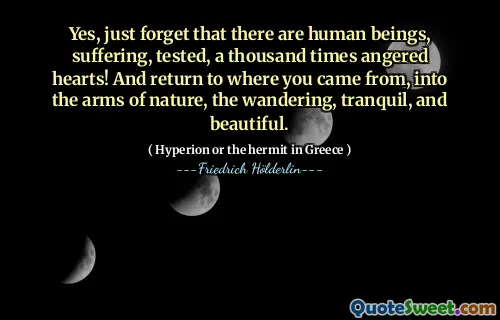"Hyperion; or, The Hermit in Greece" is a philosophical novel by Friedrich Hölderlin that delves into profound themes of nature, divine beauty, and human experience. The story is set against the backdrop of Greece, where the protagonist, Hyperion, grapples with his existential struggles and searches for a deeper truth. The narrative captures his reflections on love, loss, and the quest for meaning amidst the chaos of life and the beauty of the Greek landscape. The character of Hyperion embodies the tension between the ideal and the real, highlighting the artist's longing for a perfect world. His experiences reveal the emotional and spiritual turmoil one faces when trying to connect with the sublime while also navigating human limitations. Throughout the novel, Hölderlin weaves poetic language with philosophical insights, inviting readers to contemplate their own relationship with nature and the divine. In the end, "Hyperion" serves as a meditation on the interplay between the individual and the cosmos. Hölderlin's portrayal of Greece transcends mere geography; it symbolizes an eternal quest for enlightenment and harmony. The book challenges readers to reflect on their own lives and encourages a profound appreciation for beauty, understanding, and the transformative power of love.
"Hyperion; or, The Hermit in Greece" is a philosophical novel by Friedrich Hölderlin that delves into profound themes of nature, divine beauty, and human experience. The story is set against the backdrop of Greece, where the protagonist, Hyperion, grapples with his existential struggles and searches for a deeper truth. The narrative captures his reflections on love, loss, and the quest for meaning amidst the chaos of life and the beauty of the Greek landscape.
The character of Hyperion embodies the tension between the ideal and the real, highlighting the artist's longing for a perfect world. His experiences reveal the emotional and spiritual turmoil one faces when trying to connect with the sublime while also navigating human limitations. Throughout the novel, Hölderlin weaves poetic language with philosophical insights, inviting readers to contemplate their own relationship with nature and the divine.
In the end, "Hyperion" serves as a meditation on the interplay between the individual and the cosmos. Hölderlin's portrayal of Greece transcends mere geography; it symbolizes an eternal quest for enlightenment and harmony. The book challenges readers to reflect on their own lives and encourages a profound appreciation for beauty, understanding, and the transformative power of love.
More »
Today Birthdays
1729 -
Edmund Burke
1949 -
Haruki Murakami
1954 -
Howard Stern
1876 -
Jack London
1993 -
Zayn Malik
1951 -
Kirstie Alley
1863 -
Swami Vivekananda
1923 -
Alice Miller
1987 -
Naya Rivera
1825 -
Brooke Foss Westcott
1944 -
Joe Frazier
1951 -
Rush Limbaugh
1964 -
Jeff Bezos
1978 -
Jeremy Camp
1628 -
Charles Perrault
1856 -
John Singer Sargent
1970 -
Kaja Foglio
1953 -
Rick Santelli
1986 -
Gemma Arterton
1968 -
Raf Simons
1958 -
Christiane Amanpour
1966 -
Olivier Martinez
1996 -
Ella Henderson
1917 -
Maharishi Mahesh Yogi
1949 -
Ottmar Hitzfeld
1928 -
Ruth Brown
1968 -
Heather Mills
1946 -
George Duke
1968 -
Rachael Harris
1923 -
Ira Hayes
